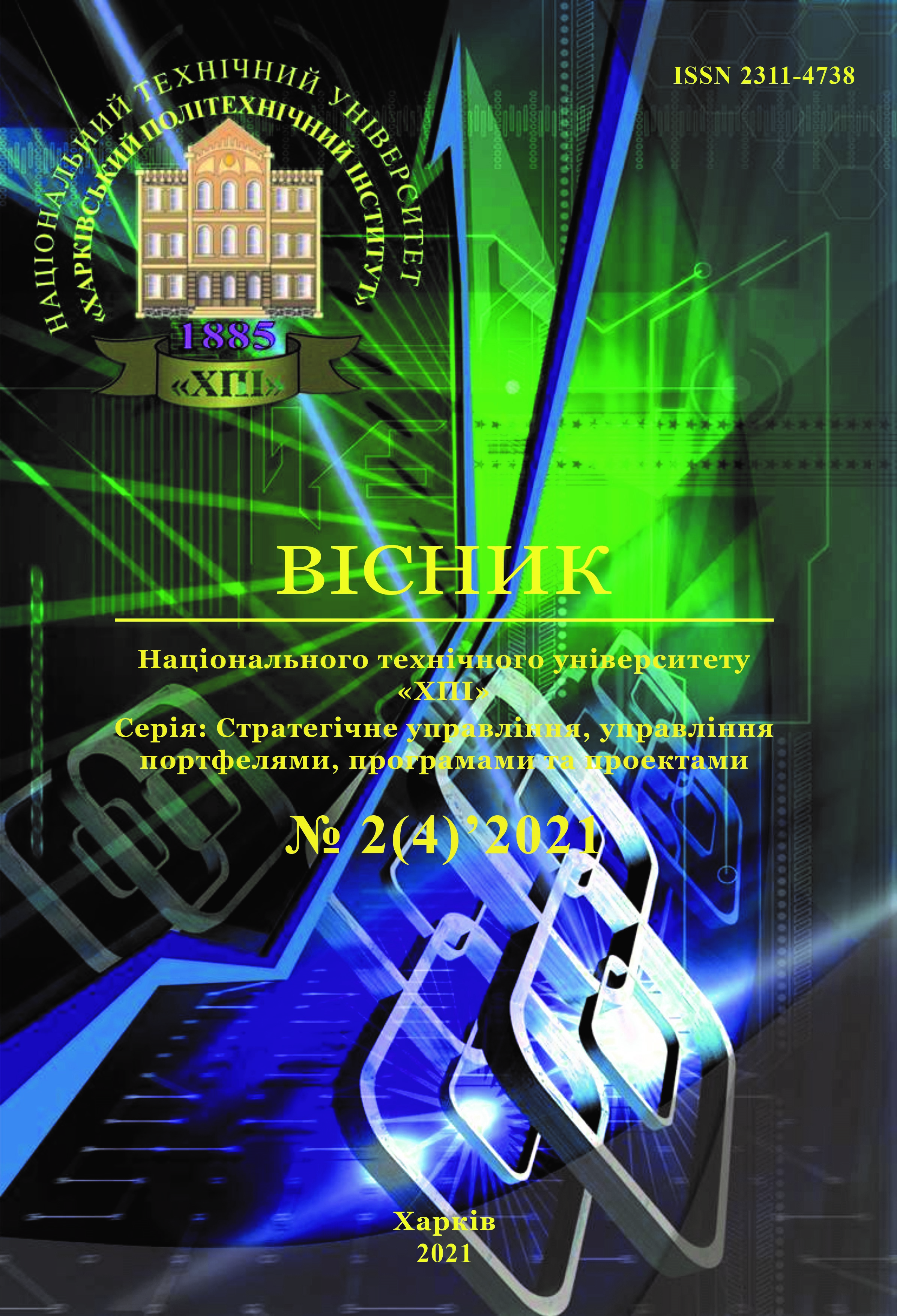METHOD OF FORMING AN EFFECTIVE TEAM OF EDUCATIONAL PROFESSIONAL PROJECTS
DOI:
https://doi.org/10.20998/2413-3000.2021.4.6Keywords:
advanced training, educational project, creativity, personnel risks, project team, degree of confidence, forming a teamAbstract
Project management methodology is widely used in various aspects of educational activities, including in the field of adult education. In-service training projects implemented by higher education institutions in the field of adult education, mainly at public expense, are limited, on the one hand, in terms of implementation, which leads to the impossibility of increasing project implementation time, then in the amount of funding regulated by relevant provisions and resolutions on the organization of professional training (advanced training) of specialists, and on the other hand, the internal regulations and rules of educational institutions on the organization of training and implementation of educational projects in the field of higher education, aimed at working with students. At the same time, the implementation of such projects is subject to increased requirements for their quality. Under such conditions, the implementation of educational projects of professional development is quite difficult. Teams of educational projects of advanced training are formed mainly of persons selected from among the internal employees of the educational institution, who are able to work with an adult audience. To form such teams, it is necessary to take into account the peculiarities of adult learning, the peculiarities of educational projects of professional development and the peculiarities of the teams of such projects. Accordingly, the management of such teams is associated with certain personnel risks that may affect the success of the project. In turn, working with teams whose members have a high creative potential requires effective management methods, one of which is the process of forming a single, coherent team of like-minded people who can effectively achieve the project goal. A method of forming teams of educational projects of advanced training, obtained as a result of cross-evaluation of qualities (creativity) of team members of such projects, taking into account their personnel risks and "degrees of trust", is proposed. It is concluded that this method allows the head of the educational project to increase the efficiency of decision-making on team building or planning of executors for the educational project of professional development, by selecting applicants with the highest "degrees of trust".
References
Turner J. R. The handbook of project – based management. Improving the processes for achieving strategic objectives. McGraw, Hill Book Co. : 1999. 540 p.
Тернер Дж. Р. Руководство по проектно-ориентированному управлению / пер. с англ. под общ. ред. В. И. Воропаева. Москва : изд. дом Гребенникова, 2007. 552 с.
Tanaka H., Bushuyev S. Innovative development and meta program management of a new generation of mega projects in the oil & gas and infrastructure sectors. Управління розвитком складних систем : зб. наук. пр. КНУБА. Київ : КНУБА, 2013. Вип. 16. С. 59–68.
Бурков В. Н., Квон О. Ф., Цитович Л. А. Модели и методы мультипроектного управления. Москва : ИПУ РАН, 1997. 63 с.
Концепція розвитку освіти на період 2015–2025 років : проект / Урядовий портал. URL: https://www.kmu.gov.ua/news/247733378 (дата звернення: 26.12.2020 р.).
Лепський В. В., Кузьмінська Ю.М. Застосування методу перехресної соціометричної оцінки до визначення креативності команди проекту. Вісник НТУ «ХПІ». Сер. Стратегічне управління, управління портфелями, програмами та проектами. Харків, 2015. № 2 (1111). С. 172–177.
Балашова Е.А. Гостиничный бизнес. Как достичь безупречного сервиса. Москва : ООО «Вершина», 2005. 176 с.
Мизинцева М. Ф., Сардарян А. Р. Оценка персонала : учебник и практикум для академического бакалавриата. Москва : Издательство Юрайт, 2018. 378 с.
Анастази А., Урбина С. Психологические тестирования. Санкт-Петербург : Питер, 2005. 688 с.
Яковлева О. Л. Психология развития творческого потенциала личности. Москва : Флинта, 1997. 165 с.
Богоявленская Д. Б. Психология творческих способностей. Москва : Экономика, 2002. 100 с.
Занора В. О. Управління кадрами: теоретичні аспекти формування проектної команди. Науковий вісник ХДУ. Сер. Економічні науки. Херсон, 2018. Вип. 30. С. 87–91.
Данченко О. Б., Бедрій Д. І., Семко І. Б. Концептуальна модель формування високоефективної команди наукового проекту. Вісник НТУ «ХПІ». Сер. Стратегічне управління, управління портфелями, програмами та проектами. Харків, 2018. № 1 (1277). С. 51–56.
Моисеев А. М., Моисеева О. М. Концептуальные основы и методы анализа образовательных систем. Москва : РОССПЭН, 2004. 240 с.
Данченко О. Б., Кузьмінська Ю. М. Концептуальна модель управління командами освітніх проектів у сфері підвищення кваліфікації. Управління проектами: стан та перспективи : матеріали ХІV міжнар. наук.-практ. конф. (м. Миколаїв, 11–14 вересня 2018 р.). Миколаїв : Національний університет кораблебудування імені адмірала Макарова, 2018. С. 35–36.
Кузьмінська, Ю. М. Метод управління трудовими ресурсами освітніх проектів. Управління проектами: інновації, нелінійність, синергетика : матеріали V міжнар. наук.-практ. конф. (м. Одеса, 12 грудня 2014 р.). Одеса : Одес. держ-на академія будівництва та архітектури, 2014. Т. 2. С. 122–125.
Bedrii D., Semko I. Cognitive model for assessing the impact of personnel risks and conflicts in scientific projects. Science and Education a New Dimension, Natural and Technical Sciences, VII(25), Issue: 206, Budapest, 2019 sept. p. 33-36. - DOI: https://doi.org/10.31174/SEND-NT2019-206VII25-08.
Downloads
Published
Issue
Section
License

This work is licensed under a Creative Commons Attribution-NonCommercial-ShareAlike 4.0 International License.
Our journal abides by the Creative Commons copyright rights and permissions for open access journals.
Authors who publish with this journal agree to the following terms:
Authors hold the copyright without restrictions and grant the journal right of first publication with the work simultaneously licensed under a Creative Commons Attribution-NonCommercial-ShareAlike 4.0 International License (CC BY-NC-SA 4.0) that allows others to share the work with an acknowledgement of the work's authorship and initial publication in this journal.
Authors are able to enter into separate, additional contractual arrangements for the non-commercial and non-exclusive distribution of the journal's published version of the work (e.g., post it to an institutional repository or publish it in a book), with an acknowledgement of its initial publication in this journal.
Authors are permitted and encouraged to post their published work online (e.g., in institutional repositories or on their website) as it can lead to productive exchanges, as well as earlier and greater citation of published work.

